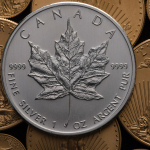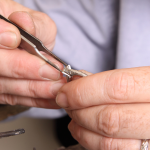While eating gold at a fancy restaurant is an extravagant event, it’s rather lackluster in a gastrointestinal sense. Pure gold is inert to all of the body’s internal chemistry – so it is tasteless and provides no nutritional value. However, there are ways to tweak gold’s formula to change this.
Aurotherapy is a branch of medicine that uses chemical compounds of gold to treat certain conditions and diseases. Most notably, gold compounds (often incorrectly referred to as gold salts) have anti-inflammatory properties. As such, gold can play a role in the treatment of inflammatory bowel disease, psoriatic arthritis, membranous nephritis, and lupus erythematosus.
Remember, in its normal state, gold doesn’t affect the body at all. It’s only useful in medicine when converted to a chemical compound, such as gold thioglucose, gold sodium thiosulfate, or gold sodium thiomalate (to name a few). Most commonly, gold compounds are prescribed for rheumatoid arthritis. They can be taken either orally or via intramuscular injection (which is more effective). After a few weeks of treatment, the gold compounds build up inside the body and reduce stiffness and swelling in the joints.
Of course, as with any medicine, there is the possibility of side effects. When gold compounds are taken orally, they may cause decreased appetite, nausea, hair thinning and diarrhea, and/or problems affecting the soft tissues, like skin, blood, kidneys, eyes, or lungs. Injection treatments can cause skin rash, mouth sores, or in rare cases, kidney problems.
Gold is not the only precious metal to play a part in the medicinal field. Silver has also been used in medicine for a long time because of its antimicrobial properties. Perhaps science will continue to discover even more great uses for precious metal!









